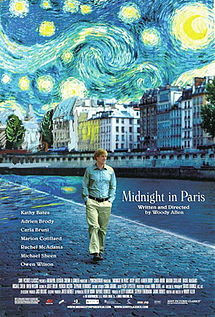Gil (Owen Wilson) and his fiancée Inez (Rachel McAdams) aren’t a particularly good match. Gil is a successful screenwriter who would prefer to be a struggling novelist while Inez is an upper-class snob who prefers Beverly Hills’ brand of culture to that of the Old World. During their vacation to Paris, Gil and Inez spend their days touring with Paul (Michael Sheen) and Carol (Nina Arianda), Inez’s insufferable friends, and their nights dining with Inez’s parents. As Gil becomes more infatuated with Paris and less happy with Inez, he begins to take midnight walks around the city to clear his head. On one of these walks he is beckoned by the occupants of an antique car to join their party, an invitation which he graciously accepts. When he arrives at the party, however, he realizes that he has journeyed back in time to the Roaring ‘20s and comes in contact with celebrities of the past such as F. Scott Fitzgerald (Tom Hiddleston) and Ernest Hemingway (Corey Stoll). Each night he journeys back to the past and upon his return to the present each morning, he finds his transition more and more difficult and leading to the inevitable confrontation between Inez and himself.
I’ve never been a big fan of Woody Allen or his films. It’s not that I don’t think he makes quality films; it’s that I’ve never really enjoyed his particular sense of humor. Maybe more to the point, I’m 28 years old which means very, VERY, few of the films Allen has made in my lifetime have mattered whatsoever and those that do matter haven’t resonated with me. In fact, Midnight in Paris is probably the first Allen movie made in my lifetime that actually made an impression on me. I’m not quite so willing to jump on the bandwagon so aggressively as to add this film to my personal top ten list, but it’s a tremendous improvement on most of Woody’s recent works.

There are three types of characters in the standard Woody Allen romance:
1. The Woody character - Woody inserts himself in basically every one of his films whether he plays the protagonist himself or farms the role out to another actor;
2. The Muse - There’s always someone or something that inspires, confuses, or otherwise entices the Woody character;
3. Everyone else - Everyone other character in a Woody Allen film is generally some form of jerk who doesn’t understand the Woody character.
Midnight in Paris is no stranger to this formula. One of the reasons this film works so well is the brilliant performance of Owen Wilson. Gil is, of course, Woody’s representation of himself within this film and Wilson plays perhaps the best Woody Allen yet (besides the man himself). Wilson exemplifies the neurosis and idiosyncrasies needed for the Allen character with flair and he delivers the requisite banter exquisitely. The Muse, in this case, is not a person but rather the collective that makes up Paris in the ‘20s. Gil falls head over heels for the glamour and the nightlife, the writers and the musicians, the dancing and the garb. He is inspired by a generation that he feels is significantly better than the one in which he was born. Everyone else is, well, everyone in Gil’s real life. Inez, her parents, and her friends are all, quite simply, horrible, boring, and obnoxious people. This is always the part of the Woody Allen Equation that bothers me, as I’d prefer it if at least one character outside of Woody and the Muse could act like a real human. In this case, however, I think Allen does a great job of playing down the stupidity of “everyone else” while focusing more on the glory of the muse and the life Gil so desperately desires. I found myself rooting for him in a way I can’t always manage in a Woody Allen film. It is a stunningly shot, richly structured film that presents a thrilling, beautiful portrait of Paris in what is undoubtedly Allen’s best film in 25 years.


